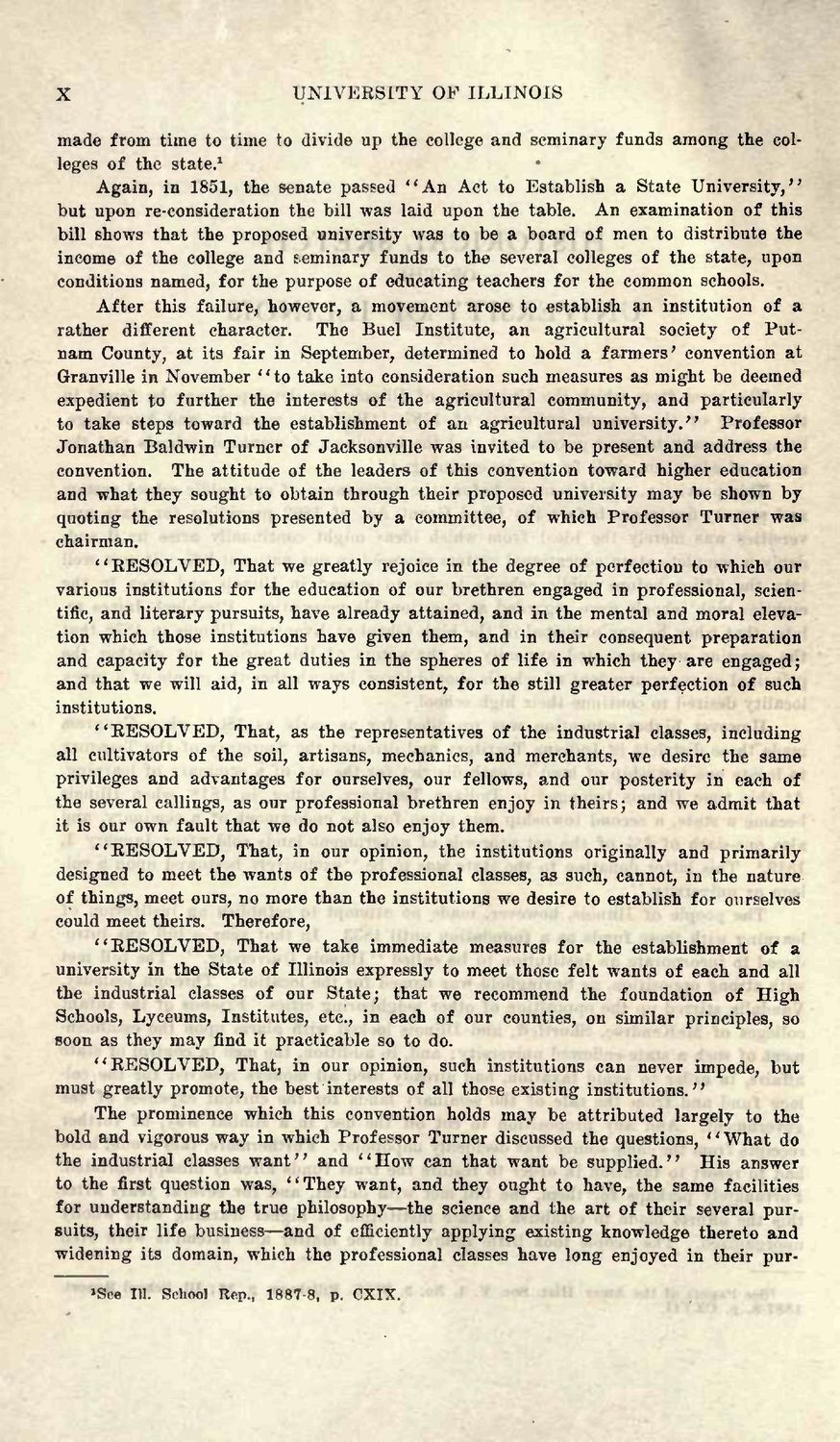| |
| |
Caption: Book - Early History of University (1916)
This is a reduced-resolution page image for fast online browsing.

EXTRACTED TEXT FROM PAGE:
X UNIVERSITY OF I L L I N O I S made from time to time to divide up the college and seminary funds among the colleges of the state. 1 Again, in 1851, the senate passed " A n Act to Establish a State University," but upon re-consideration the bill was laid upon the table. An examination of this bill shows that the proposed university was to be a board of men to distribute the income of the college and seminary funds to the several colleges of the state, upon conditions named, for the purpose of educating teachers for the common schools. After this failure, however, a movement arose to establish an institution of a rather different character. The Buel Institute, an agricultural society of Putnam County, at its fair in September, determined to hold a farmers' convention at Granville in November " t o take into consideration such measures as might be deemed expedient to further the interests of the agricultural community, and particularly to take steps toward the establishment of an agricultural university." Professor Jonathan Baldwin Turner of Jacksonville was invited to be present and address the convention. The attitude of the leaders of this convention toward higher education and what they sought to obtain through their proposed university may be shown by quoting the resolutions presented by a committee, of which Professor Turner was chairman. " R E S O L V E D , That we greatly rejoice in the degree of perfection to which our various institutions for the education of our brethren engaged in professional, scientific, and literary pursuits, have already attained, and in the mental and moral elevation which those institutions have given them, and in their consequent preparation and capacity for the great duties in the spheres of life in which they are engaged; and that we will aid, in all ways consistent, for the still greater perfection of such institutions. " E E S O L V E D , That, as the representatives of the industrial classes, including all cultivators of the soil, artisans, mechanics, and merchants, we desire the same privileges and advantages for ourselves, our fellows, and our posterity in each of the several callings, as our professional brethren enjoy in theirs; and we admit that it is our own fault that we do not also enjoy them. " E E S O L V E D , That, in our opinion, the institutions originally and primarily designed to meet the wants of the professional classes, as such, cannot, in the nature of things, meet ours, no more than the institutions we desire to establish for ourselves could meet theirs. Therefore, " E E S O L V E D , That we take immediate measures for the establishment of a university in the State of Illinois expressly to meet those felt wants of each and all the industrial classes of our State; that we recommend the foundation of High Schools, Lyceums, Institutes, etc., in each of our counties, on similar principles, so soon as they may find it practicable so to do. " R E S O L V E D , That, in our opinion, such institutions can never impede, but must greatly promote, the best interests of all those existing institutions." The prominence which this convention holds may be attributed largely to the bold and vigorous way in which Professor Turner discussed the questions, " W h a t do the industrial classes w a n t " and " H o w can that want be supplied." His answer to the first question was, " T h e y want, and they ought to have, the same facilities for understanding the true philosophy—the science and the art of their several pursuits, their life business—and of efficiently applying existing knowledge thereto and widening its domain, which the professional classes have long enjoyed in their pur•See 111. School Rep., 1887-8, p. CXIX.
| |